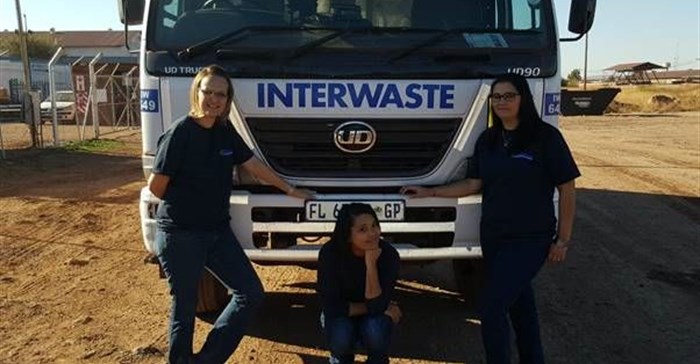The waste management sector has transformed substantially over the years with female representation on the rise. Local waste management company Interwaste believes strongly in driving female empowerment within its operations, and maintains that women will play a critical role in driving the country's 2020 zero waste to landfill objectives.
The company has employed a number of women and stationed them at some of South Africa’s most recognisable mines - including Postmasburg Beeshoek, Komela and Finsch – to undertake key waste management roles in what is known to be a male dominated sector.
Janine Titus, production coordinator at Postmasburg Beeshoek Mine
Titus, whose career in the waste management sector began three years ago, is the only woman working on-site. “As a woman providing waste management services in the mining sector, I feel empowered, given that I too am able to contribute to a previously male-dominated industry – affording me the opportunity to equally engage with my male counterparts.”
However, this is not without its challenges.
Titus adds, “I often find that there is a perception that if a woman develops an idea, people automatically believe that it is likely to fail. This, I believe, is a result of a number of reasons, including the fact that women and men aren’t built the same physically, which has led to the misconception that physical strength is the determining factor of ones success in the mining sector and waste management industry.
To help prepare her for her current role, Titus ensured that she fully equipped herself with the necessary skills to perform adequately and hold the fort in this male-dominated industry. She has completed her legal liability training, which provided her with more insight into key legislations and compliance – a central aspect of her position.
Roenette Visagie, depot supervisor at Postmasburg Northern Cape
For Visagie the best part of working in the waste management sector is “meeting new people and being able to accomplish new goals”. Her career in the waste management sector began two years ago and the best way to sum up a typical day in “her office” is "busy"! Some of her responsibilities include: assisting with customer queries, preparations for the transportation of waste loads to Johannesburg, and managing the drivers on site.
In her region, the women in the sector are beginning to take centre stage.
“I work with 15 other women on-site, and we also have a few ladies in our region doing a phenomenal job at managing large contracts, which is encouraging to see. However, as with anything, there is always room for improvement, and I believe that government and the private sector still play a key role in paving the way for more women in our sector.”
Karlien Kriel, admin clerk at Postmasburg
Kriel’s journey in the waste management sector has only just begun, and she still finds herself adapting to the day-to-day operations which she describes as "challenging".
“I don’t feel that there are enough women in the industry, and to address this I feel like government can look at perhaps sponsoring small female-owned businesses, especially those focused on recycling. This will not only help in levelling the playing field for women in the industry, but this will also assist them in achieving their zero waste to landfill target.”
Despite a short career in the waste management sector, Kriel is optimistic that women are equipped to handle equal responsibility, and that this will be key in making sure that the industry continues to develop market leading innovation, aimed at making a significant impact on the environment in the next 5–10 years.
Anneline Long, admin clerk at Postmasburg
As a woman in the sector, Long believes that women are proving that they can do more than just administrative tasks, and are, in fact, advancing in key leadership positions.
“But the only way that we will see more opportunities begin to open up for women is if we are given the opportunity to prove ourselves.”
Her career in the waste management sector is still young and so far, her experience in the industry has been challenging given how multi-faceted the industry is, largely driven by changing legislation and the current environment pressures.
While for many of the women working in waste management the industry still has a long way to go in levelling the playing field against their male counterparts, the opportunity to do so by both the private sector and government exists. To achieve this, however, it is important that the industry embraces the diverse skills that women can offer the industry.







































